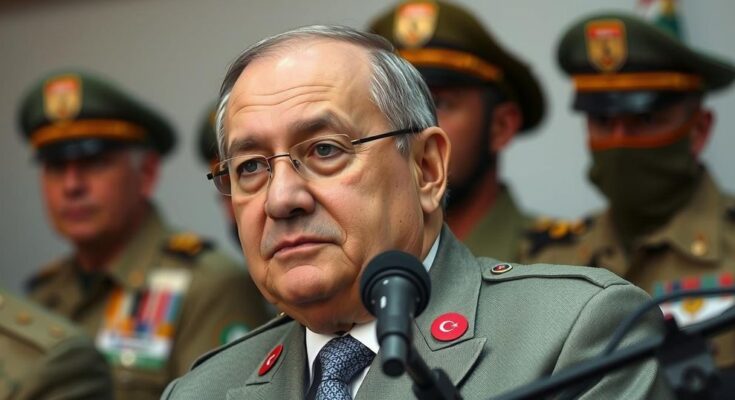Libyan Prime Minister Abdul Hamid Dabaiba opposes Russia’s military reinforcements in eastern Libya, asserting the country should not serve as a battlefield for foreign conflicts. His statements coincide with rising tensions from international scrutiny over corruption and economic instability in Libya, particularly in the oil sector. Dabaiba’s government seeks to maintain sovereignty amid increasing Russian military presence following the recent political shifts in Syria.
The Prime Minister of Libya, Abdul Hamid Dabaiba, has publicly opposed Russia’s efforts to bolster its military presence in eastern Libya following the recent shift in power dynamics in Syria. Dabaiba asserted that Libya would not become a battleground for international disputes, emphasizing that the nation should not serve as a venue for foreign military rivalries. His statements reflect growing concerns regarding the implications of foreign military interventions in Libya, which is already grappling with the aftermath of years of civil conflict since the fall of Muammar Gaddafi in 2011.
Dabaiba’s administration has received reports indicating that Russian forces are relocating military assets from Syria to eastern Libya, a region historically supported by Russian interests and leadership, notably Khalifa Haftar. The Libyan Prime Minister cautioned that allowing the transfer of Russian military equipment would exacerbate the existing crisis within the country. In discussions with the Russian ambassador, he expressed his disapproval and reiterated Libya’s desire to maintain its sovereignty against external influences.
The ongoing power struggle in Libya has been a result of a divided governance structure, with a UN-recognized government in Tripoli contending with a rival administration in the east. The geopolitical landscape complicates efforts to stabilize the nation, with Russian military assets playing a significant role. Experts like Jalel Harchaoui view Dabaiba’s remarks as a critical moment, suggesting a potential shift in Libyan politics as the Prime Minister seeks closer ties with the United States amid rising economic pressures.
Recent actions by the U.S. against Libyan institutions, including the Libyan Central Bank, highlight concerns about corruption and financial mismanagement, particularly in the oil sector, where significant revenue discrepancies have arisen. As international scrutiny increases, Libyan officials anticipate that forthcoming audits may reveal deeper financial entanglements with Russian entities. The backdrop of shifting alliances in Syria further adds to the intricacies of Russia’s military strategy in Libya, making the situation both precarious and contentious.
The geopolitical situation in Libya remains complex and fraught with tension, shaped by years of civil conflict stemming from the 2011 NATO-supported uprising that ousted long-time dictator Muammar Gaddafi. Since then, Libya has been divided between competing factions, with a UN-recognized government in Tripoli and a military-led administration in the east led by Khalifa Haftar. This struggle for power has been compounded by foreign interventions, notably from Russia, which has been accused of bolstering its military presence and influence in the region, especially following the recent ascendance of new leadership in Syria. As these dynamics unfold, key Libyan officials are increasingly vocal about the potential consequences of foreign military involvement in their domestic issues.
In summary, the resistance expressed by Libyan Prime Minister Abdul Hamid Dabaiba to Russian military reinforcements highlights Libya’s delicate position in the global arena and its ongoing struggle for sovereignty. The potential transfer of military equipment further complicates an already volatile political landscape, marked by deep-rooted internal divisions and external influences. As Libya grapples with these challenges, the actions of both foreign powers and local governments will be crucial in shaping the future of peace and stability in the nation.
Original Source: www.theguardian.com




